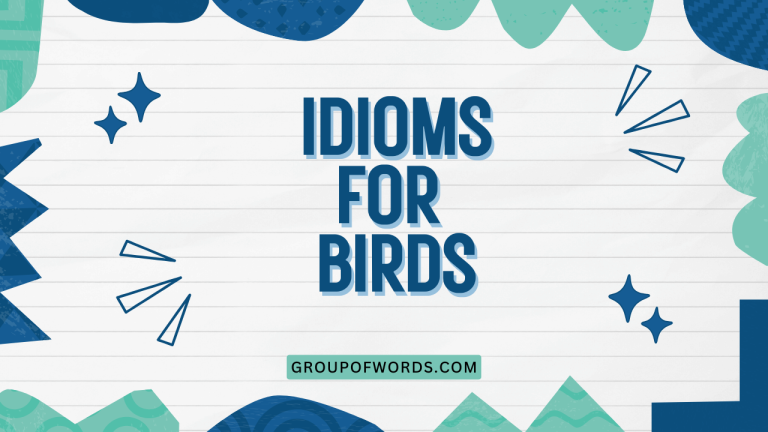Idioms for Good: Mastering Common English Expressions
Idioms are an essential part of the English language, adding color and depth to communication. Understanding idioms, particularly those related to “good,” is crucial for both comprehending and expressing oneself effectively.
This article delves into the world of idioms that convey positive meanings, exploring their definitions, structures, and usage. Whether you’re an ESL learner or a native speaker looking to enhance your vocabulary, this guide will provide you with the knowledge and practice you need to master these expressions.
Table of Contents
- Introduction
- Definition of Idioms for “Good”
- Structural Breakdown
- Types and Categories
- Examples of Idioms for “Good”
- Usage Rules
- Common Mistakes
- Practice Exercises
- Advanced Topics
- FAQ
- Conclusion
Introduction
Idioms are phrases or expressions whose meanings cannot be understood from the literal meanings of the individual words. They are a vital part of any language, adding nuance and cultural context to communication.
In English, many idioms convey the idea of “good,” whether it’s referring to positive qualities, successful outcomes, or favorable situations. Mastering these idioms is essential for achieving fluency and understanding native speakers.
This article will provide a comprehensive guide to idioms for “good,” covering their definitions, structures, usage, and common mistakes. This article is designed for English language learners and native speakers who wish to enrich their vocabulary and improve their communication skills.
Definition of Idioms for “Good”
An idiom is a phrase or expression where the overall meaning is different from the literal meaning of the individual words. Idioms for “good” are a subset of idioms that specifically convey positive, favorable, or desirable concepts.
These can range from expressing moral goodness and success to favorable conditions and positive emotions. The key characteristic of an idiom is its non-literal nature; you can’t understand its meaning simply by knowing the definitions of the words it contains.
Idioms for “good” can be classified based on their function: some describe positive qualities of a person or thing, others describe favorable situations or outcomes, and still others express positive emotions or approval. The context in which an idiom is used is crucial for understanding its intended meaning.
For instance, “in good hands” refers to being well cared for, while “a good egg” describes a kind and reliable person.
Structural Breakdown
The structure of idioms can vary widely. Some idioms are simple phrases, while others are more complex clauses or sentences.
Many idioms for “good” involve prepositions, verbs, and adjectives that combine to create a unique meaning. Understanding the structural elements of an idiom can sometimes help in deciphering its meaning, although it’s more important to learn the idiom as a complete unit.
Here are some common structural patterns:
- Adjective + Noun: a good sport, a good egg
- Verb + Preposition: come to good, do good
- Prepositional Phrase: in good shape, for good
- Clauses: it’s all good, good things come to those who wait
The grammatical structure of an idiom is often fixed, meaning that you cannot change the word order or substitute words without altering or destroying its meaning. For example, “in good condition” can be understood literally, but “in good hands” has a specific idiomatic meaning that cannot be changed without losing its essence.
Types and Categories
Idioms for “good” can be categorized based on the specific type of positive meaning they convey. Here are some common categories:
1. Positive Qualities or Characteristics
These idioms describe people or things that have positive attributes, such as kindness, reliability, or excellence.
2. Favorable Situations or Outcomes
These idioms refer to situations or results that are beneficial, successful, or desirable.
3. Positive Emotions or Approval
These idioms express feelings of happiness, satisfaction, or agreement.
4. Moral Goodness or Righteousness
These idioms relate to ethical behavior, integrity, and doing what is right.
5. General Well-being or Health
These idioms are about physical and mental health, indicating a state of being healthy and well.
Examples of Idioms for “Good”
The following tables provide extensive examples of idioms for “good,” organized by category. Each example is accompanied by its definition and a sample sentence to illustrate its usage.
Table 1: Idioms for Positive Qualities or Characteristics
The table below lists idioms used to describe positive traits in people or things. It shows the idiom, its definition, and an example sentence.
| Idiom | Definition | Example Sentence |
|---|---|---|
| A good egg | A kind, reliable, and trustworthy person. | Sarah is such a good egg; she always helps others in need. |
| A good sport | Someone who accepts losing or difficult situations gracefully. | Even though he lost the game, he was a good sport and congratulated the winner. |
| A good Samaritan | Someone who helps others, especially strangers, in need. | The Good Samaritan stopped to help the injured motorist on the side of the road. |
| A safe pair of hands | Someone who is reliable and competent. | You can trust him with this project; he’s a safe pair of hands. |
| As good as gold | Extremely well-behaved, especially children. | The children were as good as gold during the long car ride. |
| Have a good heart | To be kind and compassionate. | She has a good heart and always volunteers at the local shelter. |
| A man (or woman) of his (or her) word | Someone who keeps their promises. | He’s a man of his word; if he says he’ll do something, he will. |
| On good terms | Having a friendly or amicable relationship. | Even after the divorce, they remained on good terms for the sake of their children. |
| A diamond in the rough | Someone or something with great potential but currently unrefined. | The old house was a diamond in the rough; with some renovations, it could be beautiful. |
| A good head on one’s shoulders | To be intelligent and practical. | She has a good head on her shoulders and always makes wise decisions. |
| A stand-up guy/gal | A person of integrity and honesty. | He’s a stand-up guy; you can always count on him to do the right thing. |
| The salt of the earth | Basic, decent, and honest people. | Farmers are often considered the salt of the earth. |
| A pillar of the community | An important and respected member of a community. | The local doctor was a pillar of the community, always providing care and support. |
| An all-around good person | Someone who is generally kind, helpful, and positive. | She’s an all-around good person, always willing to lend a hand. |
| A great asset | Someone or something that is very valuable and helpful. | Her organizational skills make her a great asset to the team. |
| A true gem | A person who is highly valued and appreciated. | She’s a true gem; we’re lucky to have her on the team. |
| A blessing in disguise | Something that seems bad at first but turns out to be good. | Losing his job was a blessing in disguise, as it led him to start his own successful business. |
| A ray of sunshine | A person who brings joy and happiness to others. | Her cheerful attitude makes her a ray of sunshine in the office. |
| A breath of fresh air | Someone or something that is new and refreshing. | His innovative ideas were a breath of fresh air to the company. |
| A natural | Someone who is naturally skilled at something. | She’s a natural at playing the piano. |
Table 2: Idioms for Favorable Situations or Outcomes
The following table presents idioms used to describe situations that have positive outcomes or are generally favorable.
| Idiom | Definition | Example Sentence |
|---|---|---|
| Come to good | To have a positive or successful outcome. | Despite the initial challenges, his efforts ultimately came to good. |
| In good shape | In good physical condition or in a favorable state. | The company is in good shape financially after the successful quarter. |
| In the black | Operating at a profit; not in debt. | After years of struggling, the business is finally in the black. |
| On easy street | Living comfortably without financial worries. | After winning the lottery, they were finally on easy street. |
| The stars align | When circumstances are perfectly favorable for something to happen. | The stars aligned for them, and they secured the funding for their project. |
| Everything’s coming up roses | Everything is going well; things are very positive. | Since getting the promotion, everything’s coming up roses for him. |
| Sail through something | To succeed easily without difficulty. | She studied hard and sailed through the exam. |
| Land on one’s feet | To recover quickly from a difficult situation. | He lost his job, but he always lands on his feet and finds something even better. |
| Hit the jackpot | To have a big success or win a large prize. | They hit the jackpot when they discovered oil on their property. |
| A stroke of luck | A sudden piece of good fortune. | Finding the lost keys was a stroke of luck. |
| On a roll | Experiencing a period of success or good fortune. | The team is on a roll after winning their last five games. |
| Smooth sailing | Easy and without problems. | Once we got past the initial hurdles, it was smooth sailing. |
| A bed of roses | An easy and pleasant situation. | Life isn’t always a bed of roses, but it’s worth living. |
| A golden opportunity | A very good chance to do something. | The job offer was a golden opportunity that she couldn’t refuse. |
| In one’s favor | To be advantageous or beneficial to someone. | The judge ruled in her favor, and she won the case. |
| Have the Midas touch | To be successful in everything one does. | He seems to have the Midas touch; every business he starts becomes successful. |
| Bouncing back | Recovering quickly from a setback. | The economy is bouncing back after the recession. |
| Looking up | Improving or becoming more positive. | Things are looking up since they implemented the new strategies. |
| Turn the corner | To pass a critical point and begin to improve. | The patient has turned the corner and is now recovering well. |
| On the upswing | Improving; on the rise. | The company’s profits are on the upswing. |
Table 3: Idioms for Positive Emotions or Approval
The table below shows idioms that express approval, happiness, or other positive feelings.
| Idiom | Definition | Example Sentence |
|---|---|---|
| All good | Everything is fine or okay. | “Did you finish the report?” “Yes, it’s all good.” |
| Tickled pink | Extremely pleased or delighted. | She was tickled pink to receive the award. |
| Over the moon | Extremely happy or elated. | They were over the moon when they found out they were having a baby. |
| On cloud nine | Extremely happy and euphoric. | She’s been on cloud nine since she got engaged. |
| Happy as a clam | Very happy and content. | He’s happy as a clam now that he’s retired. |
| Make someone’s day | To make someone feel happy or pleased. | Your kind words really made my day. |
| A weight off one’s shoulders | A relief from worry or responsibility. | Getting the project done was a weight off my shoulders. |
| Music to one’s ears | Something that is very pleasing to hear. | The news of their success was music to my ears. |
| Take to something like a duck to water | To learn something very easily and naturally. | He took to coding like a duck to water. |
| Give someone the thumbs up | To give approval or encouragement. | The boss gave us the thumbs up to proceed with the plan. |
| Worth its weight in gold | Extremely valuable or useful. | A good mentor is worth their weight in gold. |
| Have a blast | To have a great time. | We had a blast at the party last night. |
| Living the dream | Living a very enjoyable and successful life. | After starting his own business, he is living the dream. |
| In good spirits | In a positive and cheerful mood. | Despite the challenges, she remained in good spirits. |
| On top of the world | Feeling extremely happy and successful. | After winning the championship, they felt on top of the world. |
| Walking on air | Feeling extremely happy and excited. | She was walking on air after receiving the acceptance letter. |
| Grin from ear to ear | To smile very widely. | He was grinning from ear to ear when he heard the good news. |
| Beaming with joy | Radiating happiness. | She was beaming with joy on her wedding day. |
| Feeling blessed | Feeling grateful for the good things in life. | I’m feeling blessed to have such a supportive family. |
| Couldn’t be better | Feeling as good as possible. | “How are you?” “I couldn’t be better!” |
Table 4: Idioms for Moral Goodness or Righteousness
This table lists idioms that relate to ethical behavior and integrity.
| Idiom | Definition | Example Sentence |
|---|---|---|
| Do good | To perform acts of kindness or charity. | She volunteers regularly to do good in her community. |
| For the greater good | For the benefit of everyone. | Sometimes sacrifices are necessary for the greater good. |
| In good faith | Honestly and sincerely. | We negotiated the contract in good faith. |
| On the right side of the law | Acting legally and ethically. | He always makes sure to stay on the right side of the law. |
| Keep one’s nose clean | To avoid trouble or wrongdoing. | After his past mistakes, he’s determined to keep his nose clean. |
| Above board | Honest and legitimate. | The business deal was completely above board. |
| On the level | Honest and truthful. | You can trust him; he’s on the level. |
| Play fair | To act justly and honestly. | It’s important to play fair in all aspects of life. |
| A clean slate | A fresh start without past mistakes. | After admitting his error, he was given a clean slate. |
| Have a clear conscience | To feel no guilt about something. | She has a clear conscience because she always tries to do what’s right. |
| Honest as the day is long | Completely honest and truthful. | You can trust her; she is as honest as the day is long. |
| Take the high road | To act in a moral and honorable way, even when it’s difficult. | Even though he was treated unfairly, he decided to take the high road. |
| Live right | To live a moral and ethical life. | She always tried to live right and set a good example for her children. |
| Do the right thing | To act in a way that is morally correct. | It is important to do the right thing, even when it’s hard. |
| A virtuous person | Someone who has high moral standards. | The community regarded her as a virtuous person because of her kindness and integrity. |
| Uphold values | To maintain and defend moral principles. | He always strives to uphold values such as honesty and respect. |
| A good influence | Someone who encourages positive behavior. | She is a good influence on her younger siblings. |
| Set a good example | To behave in a way that others can learn from. | Parents should set a good example for their children. |
| A model citizen | Someone who follows the law and contributes to society. | He is considered a model citizen because of his volunteer work and community involvement. |
| Do one’s part | To contribute to a common goal or cause. | Everyone should do their part to protect the environment. |
Table 5: Idioms for General Well-being or Health
The following table includes idioms related to physical and mental health, indicating a state of being healthy and well.
| Idiom | Definition | Example Sentence |
|---|---|---|
| In good health | Being physically and mentally well. | At 80 years old, she is still in good health. |
| As fit as a fiddle | In excellent physical condition. | Despite his age, he’s as fit as a fiddle. |
| In the pink | In good health or high spirits. | After a week of rest, she’s back in the pink. |
| A clean bill of health | Official confirmation of good health after a medical check-up. | He received a clean bill of health after his annual check-up. |
| Sound as a bell | In excellent condition; healthy. | The old engine is sound as a bell after the repairs. |
| In tip-top shape | In excellent condition. | He keeps his car in tip-top shape. |
| Full of beans | Lively and energetic. | The children are always full of beans in the morning. |
| On the mend | Recovering from an illness or injury. | He’s on the mend after his surgery. |
| Back on one’s feet | Recovered from an illness or hardship. | After a few weeks of rest, she’s finally back on her feet. |
| Doing well | Progressing or succeeding. | The patient is doing well after the treatment. |
| In good spirits | Being cheerful and positive, even in difficult circumstances. | She remained in good spirits despite her illness. |
| Healthy as a horse | Very healthy and strong. | He’s healthy as a horse and rarely gets sick. |
| In fine fettle | In good condition; healthy and fit. | The athlete is in fine fettle for the upcoming competition. |
| Keeping well | Staying healthy. | She’s been keeping well by exercising regularly. |
| Fit as a flea | Very healthy and active. | The old dog is still as fit as a flea. |
| Looking good | Appearing healthy and well. | She’s looking good since she started her new diet. |
| Strong as an ox | Very strong physically. | He’s as strong as an ox from working on the farm. |
| Sound mind in a sound body | Mental and physical health are interconnected. | He believes in having a sound mind in a sound body and exercises and meditates daily. |
| As right as rain | Perfectly well; completely recovered. | After a good night’s sleep, she was as right as rain. |
| Coming along nicely | Making good progress in recovery or improvement. | The garden is coming along nicely this spring. |
Usage Rules
Using idioms correctly requires understanding their specific meanings and contexts. Here are some general rules to keep in mind:
- Context is Key: Always consider the context in which you are using or interpreting an idiom. The same words can have different meanings depending on the situation.
- Fixed Structure: Idioms often have a fixed structure, meaning you cannot change the word order or substitute words without altering the meaning.
- Non-Literal Meaning: Remember that the meaning of an idiom is not the sum of the literal meanings of its individual words.
- Cultural Sensitivity: Be aware that idioms can be culturally specific. What is common in one culture may not be understood in another.
- Appropriateness: Consider the formality of the situation. Some idioms are more appropriate for informal conversations than formal writing.
It’s also important to pay attention to verb tenses and pronoun agreement within idioms. For example, you would say “He has a good heart,” not “He have a good heart.” Likewise, when using idioms in the past tense, ensure that the verb forms are correct.
Common Mistakes
Here are some common mistakes that learners make when using idioms for “good”:
- Literal Interpretation: Interpreting the idiom literally instead of understanding its figurative meaning.
- Incorrect Word Order: Changing the word order of an idiom, which can alter or destroy its meaning.
- Wrong Verb Tense: Using the incorrect verb tense within the idiom.
- Misunderstanding Context: Using the idiom in an inappropriate context.
- Overusing Idioms: Using too many idioms in a single conversation or piece of writing, which can sound unnatural.
Here are some examples of correct and incorrect usage:
| Incorrect | Correct | Explanation |
|---|---|---|
| She is having a good head on her shoulders. | She has a good head on her shoulders. | The correct idiom is “has a good head,” not “is having.” |
| He came to well. | He came to good. | The idiom is “come to good,” not “come to well.” |
| They are in a good shape. | They are in good shape. | The article ‘a’ is not used in this idiom. |
| She was tickling pink. | She was tickled pink. | The correct form is “tickled,” not “tickling.” |
Practice Exercises
Test your understanding of idioms for “good” with the following exercises.
Exercise 1: Fill in the Blanks
Complete the following sentences with the correct idiom from the list below.
Idiom List: a good egg, in good shape, on easy street, all good, do good, on the right side of the law, a clean bill of health, over the moon, worth its weight in gold, come to good
| Question | Answer |
|---|---|
| 1. She’s such ________; she always helps those in need. | a good egg |
| 2. After years of hard work, their business finally ________. | come to good |
| 3. The doctor gave him ________ after his check-up. | a clean bill of health |
| 4. She was ________ when she got accepted into her dream university. | over the moon |
| 5. As long as you stay ________, you’ll be fine. | on the right side of the law |
| 6. A reliable car mechanic is ________. | worth its weight in gold |
| 7. Everything is ________; we can proceed with the plan. | all good |
| 8. He believes in using his wealth to ________ in the world. | do good |
| 9. After winning the lottery, they were ________. | on easy street |
| 10. The company is ________ financially after the successful year. | in good shape |
Exercise 2: Multiple Choice
Choose the correct meaning of the idiom in the following sentences.
| Question | Options | Answer |
|---|---|---|
| 1. He landed on his feet after losing his job. What does “landed on his feet” mean? | a) Fell down badly b) Recovered quickly c) Stayed unemployed d) Became angry | b) Recovered quickly |
| 2. Everything’s coming up roses for her since she got promoted. What does “everything’s coming up roses” mean? | a) Things are difficult b) Things are going well c) Things are staying the same d) Things are confusing | b) Things are going well |
| 3. She took to playing the guitar like a duck to water. What does “like a duck to water” mean? | a) Disliked it immediately b) Learned it very slowly c) Learned it very easily d) Avoided it completely | c) Learned it very easily |
| 4. He’s been on cloud nine since his wedding. What does “on cloud nine” mean? | a) Slightly happy b) Very sad c) Extremely happy d) Feeling ill | c) Extremely happy |
| 5. They negotiated in good faith. What does “in good faith” mean? | a) With bad intentions b) Dishonestly c) Honestly and sincerely d) Reluctantly | c) Honestly and sincerely |
| 6. He is a safe pair of hands. What does “a safe pair of hands” mean? | a) Dangerous and unreliable b) Reliable and competent c) Clumsy and careless d) Inexperienced and unsure | b) Reliable and competent |
| 7. The project came to good in the end. What does “come to good” mean? | a) Failed miserably b) Had a positive outcome c) Was delayed indefinitely d) Caused many problems | b) Had a positive outcome |
| 8. She’s as fit as a fiddle. What does “as fit as a fiddle” mean? | a) Very ill b) In excellent physical condition c) Slightly tired d) Moderately healthy | b) In excellent physical condition |
| 9. He’s a stand-up guy. What does “a stand-up guy” mean? | a) A dishonest person b) A person of integrity c) An unreliable person d) A secretive person | b) A person of integrity |
| 10. They are on good terms. What does “on good terms” mean? | a) In a state of conflict b) Having a friendly relationship c) Completely estranged d) Indifferent to each other | b) Having a friendly relationship |
Exercise 3: Sentence Completion
Choose the best idiom to complete each sentence.
| Question | Options | Answer |
|---|---|---|
| 1. After receiving the award, she was ________. | a) in the black b) tickled pink c) on easy street d) a good sport | b) tickled pink |
| 2. He’s always willing to help others; he has ________. | a) a good heart b) a clean slate c) a diamond in the rough d) the Midas touch | a) a good heart |
| 3. The company is finally ________ after a long period of losses. | a) in good health b) in the black c) on cloud nine d) on the mend | b) in the black |
| 4. It’s important to ________ and treat everyone fairly. | a) keep your nose clean b) play fair c) do good d) stay on top of the world | b) play fair |
| 5. Despite the challenges, she remained ________. | a) full of beans b) in good spirits c) on a roll d) on easy street | b) in good spirits |
Advanced Topics
For advanced learners, exploring the origins and evolution of idioms can provide a deeper understanding of their meanings and cultural significance. Many idioms have historical roots that reflect past customs, beliefs, or events.
Researching the etymology of idioms can be a fascinating way to enhance your knowledge of the English language.
Additionally, understanding the nuances of regional variations in idiom usage can be valuable. While some idioms are universally understood, others may be more common in certain regions or dialects.
Exposure to different forms of English can broaden your appreciation for the richness and diversity of idiomatic expressions.
Another advanced topic is the use of idioms in literature and rhetoric. Authors and speakers often use idioms to add color, emphasis, or humor to their work.
Analyzing how idioms are employed in different contexts can improve your ability to interpret and appreciate complex texts.
FAQ
Frequently Asked Questions About Idioms for “Good”
Why is it important to learn idioms?
Learning idioms is crucial for understanding native speakers, enhancing your communication skills, and adding depth to your language proficiency. Idioms provide cultural context and nuance that literal language often lacks.
How can I improve my understanding of idioms?
To improve your understanding of idioms, read widely, listen to native speakers, practice using idioms in context, and consult idiom dictionaries or online resources.
Are idioms the same in all English-speaking countries?
No, idioms can vary across different English-speaking countries and regions. Some idioms are universally understood, while others are specific to certain areas.
Can I create my own idioms?
While it’s generally not advisable to create your own idioms, as they may not be understood by others, you can adapt existing idioms to suit specific contexts, provided that the meaning remains clear.
Is it okay to use idioms in formal writing?
The use of idioms in formal writing depends on the context and audience. While some idioms may be appropriate, others may be too informal.
It’s important to exercise discretion and choose idioms that align with the tone of your writing.
How do I avoid misusing idioms?
To avoid misusing idioms, pay attention to their specific meanings, contexts, and structures. Practice using idioms in sentences and get feedback from native speakers or language teachers.
Where can I find reliable resources for learning idioms?
You can find reliable resources for learning idioms in idiom dictionaries, online language learning platforms, ESL textbooks, and websites dedicated to English language and culture.
Are there any idioms that should be avoided?
Yes, some idioms may be offensive, outdated, or culturally insensitive. It’s important to be aware of the potential implications of idioms and avoid using those that could cause offense.
How often should I study idioms?
The frequency of studying idioms depends on your learning goals and available time. However, regular exposure and practice are essential for mastering idiomatic expressions.
Aim to learn a few new idioms each week and review them periodically.
What is the best way to memorize idioms?
The best way to memorize idioms is to use them in context, create flashcards, practice with native speakers, and associate idioms with memorable images or stories.
Conclusion
Mastering idioms for “good” is an ongoing process that requires dedication, practice, and cultural awareness. By understanding the definitions, structures, and usage rules of these expressions, you can significantly enhance your English language skills and communicate more effectively.
Remember to pay attention to context, avoid common mistakes, and continue to expand your vocabulary through reading and interaction with native speakers. With consistent effort, you can confidently incorporate idioms into your everyday conversations and writing, adding color and depth to your communication.






